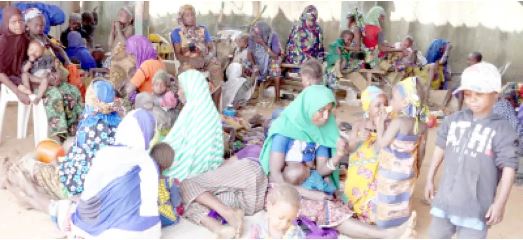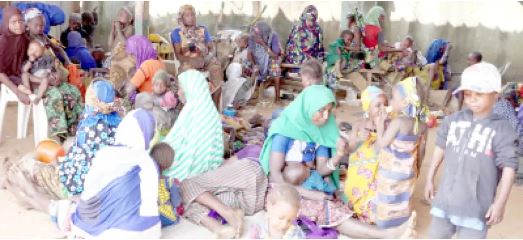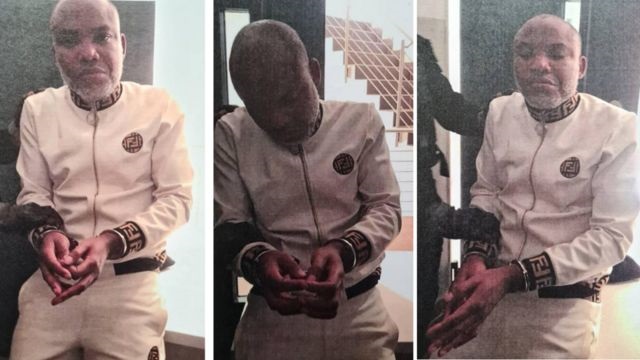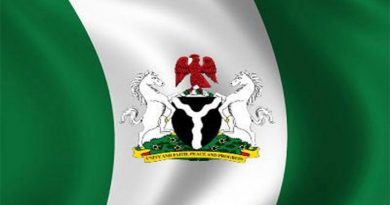Why We Fled Taraba — Fulani Herders Speak
Fulani herders have spoken about why they fled Taraba State.
Children crying, women distraught and men angry were the images at the Mararaba motor park in Nasarawa State, near the Federal Capital Territory (FCT), where over 100 Fulani temporarily camped after they fled Taraba State.
They claimed they were victims of repeated onslaughts by men they alleged were state government-sponsored vigilante groups, who killed some of them and chased others out of their community.
Sleeping in open spaces under harsh weather conditions, one of the victims, Usman Dan Usman, narrated their harrowing experience to Daily Trust Saturday, saying, “No cattle, no goat, and here, we are being chased like chicken. For God’s sake, are we not Nigerians?”
Usman alleged amidst tears that their attackers did not spare anything after an unofficial quit notice that started as rumour.
“We thought it was a joke as our village head did not notify us of anything. We thought that nothing would happen to us. But suddenly, we saw them and they followed us to our houses, killing and confiscating our cattle and chickens.
“They killed children and the elderly. We don’t know our offence. If someone has committed a crime, that person should be identified and be brought to book,” he added.
Taraba State has faced decades of ethno-religious and communal crises that have claimed many lives. From the Tiv-Jukun crisis to the Jukun-Fulani crisis, as well as farmer-herder crisis, thousands have been displaced from their communities.
Umar Babuga, a teenager, said members of the vigilante group attacked them on a field and confiscated over 200 cattle. Babuga, who is still searching for his elder brother, said he was afraid that his brother may have been killed.
He said, “That morning, we took our livestock to drink water when the vigilantes came on motorcycles and some on foot, shooting towards our direction.
“They confiscated our cattle. We fled, but our elder brother could not run. They took everything and him as well. While we were running, we heard gunshots and presumed they may have killed him. We searched for him but couldn’t find him. There was no trace of his remains.”
When contacted, the Taraba State police command said it did not have any report that the Fulani in the state were attacked and forced to flee their homes.
The police public relations officer in the state, Usman Abdullahi said, “The command is not aware that some Fulani residents have been attacked and chased out of their houses and forced to relocate to the FCT.”
But motor parks in Jalingo, the Taraba State capital, paint a contrary picture. Our correspondent reports that more Fulani women, children and the elderly have been camped in open spaces, awaiting their exit from the state.
While there are victims of attacks at the Mararaba motor park, not everyone who fled Taraba State was directly affected.
Umaru Abubakar from Gayam in Gashaka Local Government Area said the excesses of the vigilantes had inflicted fear on him and members of his family, forcing them to flee.
“We fled because of horrific news from neighbouring communities, such as Jatau in Bali Local Government Area.
“We are peaceful; nobody has ever caught us on someone’s property, but these people are tracking our villages, killing our people and setting our houses on fire,” Abubakar said, adding that even those who had lived in the community for over 20 years were forced to flee.
“The massacre started in the Jatau area of Bali Local Government Area. Animals were rustled in Jatau, farm produce catered away and others burnt. Seeing this scared us, so we fled,” Muhammadu Ibrahim said, adding that he was forced to flee with his family.
Victims of the attacks also claimed that they noticed a pattern of repeated attacks at Fulani communities populated by herders from the Sullubawa clan. They are also referred to Bokolo Fulani. They claimed that the attacks on Bali and Gashaka communities had been selective.
Speaking on how members of the vigilante group are able to identify those from the Sullubawa clan, Umar Abubakar, one of the victims, said they were identified by their cattle.
“The Sullubawa keep Bokolo known as the Sokoto Gudali, while the Bororo keep long-horned cattle, known as the red Fulani,” he said.
Speaking to Daily Trust Saturday, the Taraba State vice chairman of the Miyetti Allah Cattle Breeders Association of Nigeria (MACBAN), Baba Suleiman, said the crisis started from Gasol Local Government Area around April 2022
“Alleged cases of kidnapping in the Gasol area by the Bokolo Fulani clan triggered the crises,” he said, adding that indigenous communities in some parts of Taraba State had “gathered their vigilante groups or hunters and went after them and confiscated their cattle.”
Suleiman, however, said the leadership of the MACBAN had conveyed a meeting with local chiefs in the area and urged them to put an end to attacks on the Fulani so that innocent ones would not be harmed.
He said the MACBAN and other Fulani associations had met with the state government and urged them to tackle the situation with seriousness.
“After our discussions with government officials, we can say that the problem is abating,” he said.
***
Source: Daily Trust






